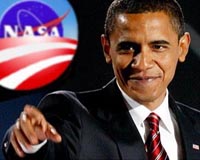 |
Washington DC (SPX) Oct 01, 2010 Should scientists working as government contractors be forced to submit to unrestricted and intrusive background checks-even when their work is low risk, unclassified, and doesn't require security clearance? For 28 scientists and engineers at the NASA Jet Propulsion Lab (JPL) at California Institute of Technology in Pasadena, California, the answer is no. In 2007, they sued NASA to challenge the background checks as illegal and unjustified violations of their privacy. On October 3, 2007, the Federal District Court in Los Angeles dismissed the case; two days later the U.S. Ninth Circuit Court of Appeals agreed with the scientists and issued an emergency injunction stopping the checks, which is still in effect. Two years later, in November 2009, the federal government appealed, and the Supreme Court agreed to hear the case. The JPL scientists and NASA will present their arguments before the court on October 5. The case raises important questions about constitutional privacy rights, and the longstanding federal policy that protects the independence of federally funded research institutions such as JPL. It also raises concerns that this intrusion will dissuade researchers from working at these institutions. "This rule is an unwarranted and illegal invasion of our privacy," said Robert Nelson, a senior JPL scientist and the lead plaintiff in the case. "It would be one thing if our work was classified, but it has nothing to do with national security or the threat of terrorism. This rule has the potential to create an atmosphere of intimidation among our researchers." The controversy began in 2004 when NASA, then under Bush appointee Michael Griffin, ordered all scientists at JPL to undergo comprehensive, open-ended background checks or lose their jobs. The checks would go far beyond the usual pre-hiring reviews that most federal employees experience. By agreeing to these background checks, the scientists would give the government free rein to investigate every aspect of their lives, including their financial and medical records. NASA maintains it was following an executive order from President George W. Bush, who issued the new rule to tighten security following the September 11, 2001, terrorist attacks. But President Bush's order did not mention background investigations, which staff at NASA headquarters added later. Other departments covered by the rule, such as the Department of Energy, did not institute similar checks for scientists doing unclassified research. The JPL contractors' suit does not challenge the government's right to perform comprehensive background checks when necessary, only when scientists are performing unclassified work that does not involve national security. The plaintiffs argue that the checks violate their rights under the First, Fourth and Fifth Amendments and the Federal Privacy Act. The plaintiffs, who do not have security clearances or access to classified data, are accomplished scientists and engineers who have worked on a range of well-known projects, including the Mars rovers and the Galileo probe to Jupiter. "It is very disappointing that the Obama administration has decided to pursue this appeal, which conflicts with its policy of restoring science to its rightful place," said Kurt Gottfried, a UCS co-founder and board member, and an emeritus professor of physics at Cornell University. "If the government succeeds in this attempt to delve into the private lives of scientists doing unclassified research on its behalf, it will harm its ability to attract high-caliber researchers, and undermine the quality of scientific institutions like the Jet Propulsion Laboratory, which have put the United States at the cutting edge of science and technology." Gottfried said UCS has a keen interest in this case based on its long history of working to shield science from political interference. In October 2007, UCS filed an amicus, or "friend of the court," brief with the U.S. Federal Appeals Court supporting the JPL plaintiffs' suit. Last year, UCS wrote a letter asking U.S. Attorney General Eric Holder not to appeal the case to the Supreme Court. After the Supreme Court accepted the government's appeal, UCS filed another amicus brief last month.
Share This Article With Planet Earth
Related Links Union of Concerned Scientists Space Tourism, Space Transport and Space Exploration News
 CSF Applauds Historic Vote Setting NASA's New Direction
CSF Applauds Historic Vote Setting NASA's New DirectionWashington DC (SPX) Oct 01, 2010 The Commercial Spaceflight Federation applauds last night's historic vote by the House of Representatives approving the NASA Authorization Act of 2010, a bill already passed by the Senate on August 5. The legislation now goes to the President for his signature. The bill specifies $1.612 billion for commercial crew and cargo programs, including $612 million in Fiscal Year 2011, and sets the ... read more |
|
| The content herein, unless otherwise known to be public domain, are Copyright 1995-2010 - SpaceDaily. AFP and UPI Wire Stories are copyright Agence France-Presse and United Press International. ESA Portal Reports are copyright European Space Agency. All NASA sourced material is public domain. Additional copyrights may apply in whole or part to other bona fide parties. Advertising does not imply endorsement,agreement or approval of any opinions, statements or information provided by SpaceDaily on any Web page published or hosted by SpaceDaily. Privacy Statement |